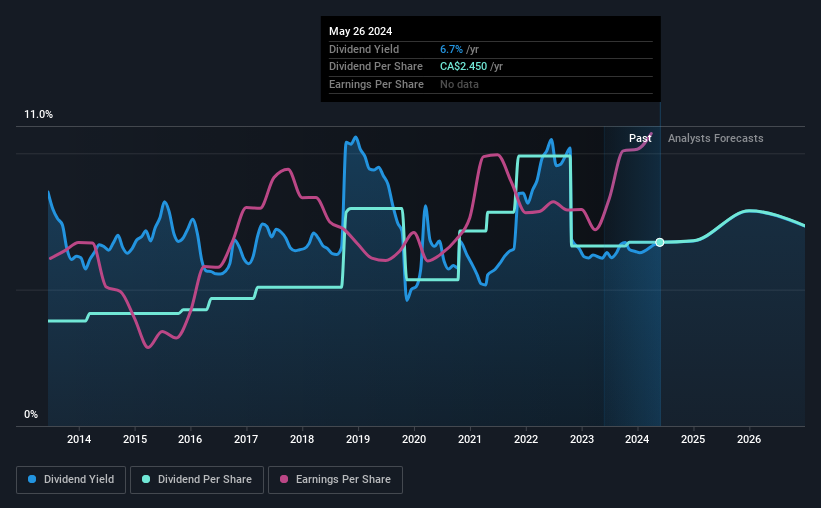First National Financial Corporation (TSE:FN) Looks Like A Good Stock, And It's Going Ex-Dividend Soon
It looks like First National Financial Corporation (TSE:FN) is about to go ex-dividend in the next 4 days. The ex-dividend date occurs one day before the record date which is the day on which shareholders need to be on the company's books in order to receive a dividend. The ex-dividend date is important because any transaction on a stock needs to have been settled before the record date in order to be eligible for a dividend. This means that investors who purchase First National Financial's shares on or after the 31st of May will not receive the dividend, which will be paid on the 14th of June.
The company's next dividend payment will be CA$0.204167 per share, and in the last 12 months, the company paid a total of CA$2.45 per share. Calculating the last year's worth of payments shows that First National Financial has a trailing yield of 6.7% on the current share price of CA$36.41. If you buy this business for its dividend, you should have an idea of whether First National Financial's dividend is reliable and sustainable. We need to see whether the dividend is covered by earnings and if it's growing.
Check out our latest analysis for First National Financial
Dividends are usually paid out of company profits, so if a company pays out more than it earned then its dividend is usually at greater risk of being cut. First National Financial paid out more than half (55%) of its earnings last year, which is a regular payout ratio for most companies.
Companies that pay out less in dividends than they earn in profits generally have more sustainable dividends. The lower the payout ratio, the more wiggle room the business has before it could be forced to cut the dividend.
Click here to see the company's payout ratio, plus analyst estimates of its future dividends.
Have Earnings And Dividends Been Growing?
Businesses with strong growth prospects usually make the best dividend payers, because it's easier to grow dividends when earnings per share are improving. If business enters a downturn and the dividend is cut, the company could see its value fall precipitously. With that in mind, we're encouraged by the steady growth at First National Financial, with earnings per share up 10.0% on average over the last five years.
Another key way to measure a company's dividend prospects is by measuring its historical rate of dividend growth. First National Financial has delivered an average of 5.8% per year annual increase in its dividend, based on the past 10 years of dividend payments. We're glad to see dividends rising alongside earnings over a number of years, which may be a sign the company intends to share the growth with shareholders.
To Sum It Up
Should investors buy First National Financial for the upcoming dividend? First National Financial has been generating some growth in earnings per share while paying out more than half of its earnings to shareholders in the form of dividends. We're unconvinced on the company's merits, and think there might be better opportunities out there.
If you want to look further into First National Financial, it's worth knowing the risks this business faces. For example - First National Financial has 2 warning signs we think you should be aware of.
A common investing mistake is buying the first interesting stock you see. Here you can find a full list of high-yield dividend stocks.
Have feedback on this article? Concerned about the content? Get in touch with us directly. Alternatively, email editorial-team (at) simplywallst.com.
This article by Simply Wall St is general in nature. We provide commentary based on historical data and analyst forecasts only using an unbiased methodology and our articles are not intended to be financial advice. It does not constitute a recommendation to buy or sell any stock, and does not take account of your objectives, or your financial situation. We aim to bring you long-term focused analysis driven by fundamental data. Note that our analysis may not factor in the latest price-sensitive company announcements or qualitative material. Simply Wall St has no position in any stocks mentioned.

 Yahoo Finance
Yahoo Finance 